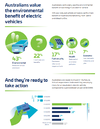- Joined
- 29 January 2006
- Posts
- 7,222
- Reactions
- 4,452
Hey, I'm not defensive about this topic.Like I said,
That is probably true @rederob , but I would also think that most of the people who are currently buying or own an electric vehicle, are those who don't use a car as an essential component of their life e.g for work.
It isn't a pizzing competition it is an observation, why get all defensive buyers remorse? or just wanting positive reinforcement.
I just don't know if there is anything anywhere about who is buying EVs and their primary use.
As the US survey posted above showed, early EV adopters were often save the planet types, until Teslas started whipping ICEVs on performance and technology. A lot of water now under the bridge with China now the major manufacturer of NEVs, including Teslas, and availability globally increasing at greater than 100% per year.
With such pitiful total ownership levels in Australia it's hard to know who would actually buy an EV if more models were available at more price points when the actual decision to buy another car was being made.
I am hoping BYD can get their Dolphin models into Australia for under $40k and for the first time show how good these cars are compared to ICEV equivalents. They are going into the UK market, so right hand drives are now being produced, which at least solves that production issue.



